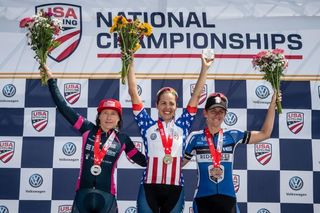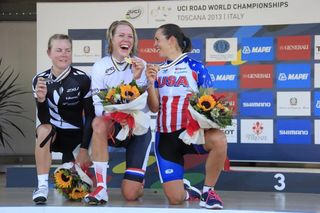USA Cycling to revisit Olympic Games selection procedures after triple arbitrations
Bouchard-Hall rebuts accusations of bias, suggests Olympic trials may return





In the run-up to the Olympic Games in Rio de Janeiro, USA Cycling has had to defend itself in three separate legal cases against its selection process, leading new CEO Derek Bouchard-Hall to set the goal of reviewing the selection procedures beginning the day after this year's Games.
Bouchard-Hall: First team pursuit gold is important for our whole track programme
Small ups her Olympic bid with time trial national title
Kristin Armstrong still optimistic about Olympic selection
Small heartbroken over missing out on US selection for Rio Olympics
Small explains decision to take USA Cycling Olympic team selection to arbitration
Small, Neben lose arbitration cases over US Olympic spots
Guarnier one of four big cards to play for Team USA at Rio Olympics
The selection committee choose three riders to fill the team - only Megan Guarnier won an automatic bid with her bronze medal in the world championships. Kristin Armstrong and Evelyn Stevens were chosen to fill the time trial spots, and Carmen Small and Amber Neben, were not. Climber Mara Abbott completed the team.
Bouchard-Hall fought back against public perception of bias in the selection of two-time Olympic gold medalist Armstrong over Small, who dominated in the national championships on a similar course and in similar conditions. Small and Neben fought the selection in arbitration and lost.
Jim Miller, USA Cycling's athletics director, also happens to be Armstrong's personal coach. Miller developed the selection criteria, assembled the selection committee, and came up with the method for aggregating rider data and presenting it to the committee. He declared the conflict of interest, and left it to the women's road coach, Jack Seehafer, to make the actual data and recommendations to the selection committee.
Bouchard-Hall said he was confident that there was no opportunity for bias to be introduced in the process, but wants to avoid having this sort of negative public perception in the future.
"We're certainly going to revisit that as part of the next process. When we have those conflicts of interest it certainly opens us up to accusations of bias and unfairness. Even if in reality we can separate ourselves from those, the perception is a real problem. We have a legacy of challenges that lead to that," Bouchard-Hall said.
Miller's main objective - Olympic medals - would trump any personal relationship with an athlete, he said. "His career in on the line by what happens with the team in Rio; it's not on the line with his personal coaching relationships."
Get The Leadout Newsletter
The latest race content, interviews, features, reviews and expert buying guides, direct to your inbox!

Subjectivity
The case of the women's road team highlighted the difficulties of balancing objective criteria while at the same time allowing for the appropriate amount of judgement on behalf of the committee. Most other countries never put themselves in the position of giving athletes an opportunity to fight selection choices - countries like Belgium, the Netherlands, Italy all allow the national coaches to pick the best athletes, end of story.
- Yonamine wins fight to represent Japan at Olympic Games
- Canadian Numainville appeals Olympic Games exclusion
"The arbitration process is pretty unique to the US, and it's part of American sport that you have the right to appeal. It does mean you have to run a really tight ship in your process and it creates a whole slew of challenges. Administratively it's very difficult to do," Bouchard-Hall told Cyclingnews. The selection procedures were intended to include the kind of subjectivity that other countries have while giving concrete guidelines on how to apply them.
"I was not behind the intent of the current selection criteria, which was to allow discretionary selection by a committee based on as objective criteria as can be created. I don't know if that will be the ethos for the future, but if it is, the document needs to be more clearly written and more specific. The language that is used needs to be better.
"My observation on the process is we had people who are, to the best of their ability, trying to execute a fair process, without bias, in a transparent way, to get to a fair outcome. But the process, and USAC's history, all left this open to criticisms of unfairness and bias. We need to make it easier for everyone to believe in the process, and we are going to work on that in the future."
(There was a second arbitration for Coryn Rivera, who argued she should have been chosen over Mara Abbott but lost. The third, which USA Cycling lost, kept them from excluding track racer Bobby Lea from the team because he was banned for an anti-doping rule violation at the time of the selection, but became eligible to race before the Games.)
Bouchard-Hall called the ever-evolving selection process that he inherited "a horse designed by committee".
"We need a document that has less ambiguity and more clarity. It is still effective, but it's more ambiguous than you'd want if you have arbitrations and lawyers trying to dissect language."
Although Small was careful to say she was not taking up the arbitration against any particular rider - only against the process itself - Bouchard-Hall argued that Armstrong was the correct choice. He said that while Armstrong's results are "lean", they were all strong, while Small's slew of international results had only a few top placings.
"[Armstrong] was 20 seconds away from winning the World Championships. That's a strong result. At the Tour of the Gila she beat the reigning world champion in that event. She's virtually on the podium in the time trial in any race she's competed in, even since her comeback," he said.
"Carmen has a lot of results outside the top 10 over the last couple of years. You need to compete internationally and win, and succeed. Any top 20 in an international field is a remarkable result. I don't want to belittle that for a second. But when we're talking about the Olympics, we're not talking about finishing 14th. We're talking about being on the podium, winning a medal - that's what matters.
"It's not about how often you compete, it's about demonstrating that you can beat the best in the world."
When challenged with the fact that Small's and Neben's string of international results helped to keep the US in the top five of the UCI rankings and ensure the country won the maximum four places in the Olympic Games, Bouchard-Hall agreed that keeping riders incentivised for international competition is difficult to balance with the country's end-goal of earning Olympic medals.
"A selection process that only focuses on the very end [of the Olympic cycle], might miss that we need to maximize the number of spots we're picking for... I don't know how we incent that as part of the selection process. You might have to pick an athlete who doesn't represent the best chance for a medal because they gave us a chance to get there - I'm not sure that's justifiable. That's a tricky problem to solve. We might have to incentivize that outside Olympic selection - Worlds, Pan Ams, financial support. It's really important, and I'm not sure how we bake that in. We have to focus on getting the best athletes to the Olympics."

Objectivity
Bouchard-Hall laid out a four-point plan for improving the Olympic selection process to Cyclingnews, beginning with the language of the selection criteria.
In Small's case, the arbitrator wrote: "It does seem ... that some of the circular logic in looking at past results to demonstrate medal capability in the future, under the definition of Medal Capable, could be eliminated and the standards could be made much clearer by USAC."
Bouchard-Hall's second bullet point is to ensure, "When we do make subjective decisions, we will make sure we're doing it on the right basis and the right criteria and priorities."
The arbitrator, Maidie Oliveau, noted that the four athletes named in the case - Small, Neben, Armstrong and Stevens - each targeted different events in the lead-up to Rio: "It thus appears that the four athletes are applying the specifics of the criteria in varying ways, and perhaps USAC could have improved the definition by which they would be judged by USAC in making its selection," she wrote.
Third, USA Cycling needs to put more of a buffer between Miller and the selection process. "We need to revisit all of that," Bouchard-Hall said.
In the future, Bouchard-Hall wants to see more objectivity in the process, and introducing an Olympic trials event for some of the spots is one way they could do that.
"Head-to-head competitions are absolutely possible - the time trial lends itself to this, and we will examine that going forward. For me, it's not just about a more objective way to do it; it's an event we can create to make our sport more exciting, which is a real objective of ours.
"The Olympics introduce an awful lot of drama. With the selection process, some of the drama was not good drama, but the heartbreak of not being picked and the joy of being selected - that's all the drama that we seek from sports. We want people to win, but that only happens by people losing. That's all part of this human drama and the Olympics magnify all that. The selection process itself is a wonderful drama, and all of us here are deeply committed to making that the right kind of drama."
But as long as the country continues to have such a wealth of talent, there will always be heartbreak every four years.
"It is a failure of the Olympic system that Carmen is not competing - she should be - she absolutely has a chance of winning a medal there. But we only have four spots, two for the time trial because ... the IOC limits the number of athletes. We had to decide between a remarkable crop of athletes. Amber, Evelyn, Kristin and Carmen are at the very top of the world in time trialing and we only got to choose two. That's the injustice of the Olympic system for Amber and Carmen."

Thank you for reading 5 articles in the past 30 days*
Join now for unlimited access
Enjoy your first month for just £1 / $1 / €1
*Read any 5 articles for free in each 30-day period, this automatically resets
After your trial you will be billed £4.99 $7.99 €5.99 per month, cancel anytime. Or sign up for one year for just £49 $79 €59

Join now for unlimited access
Try your first month for just £1 / $1 / €1

Laura Weislo has been with Cyclingnews since 2006 after making a switch from a career in science. As Managing Editor, she coordinates coverage for North American events and global news. As former elite-level road racer who dabbled in cyclo-cross and track, Laura has a passion for all three disciplines. When not working she likes to go camping and explore lesser traveled roads, paths and gravel tracks. Laura specialises in covering doping, anti-doping, UCI governance and performing data analysis.